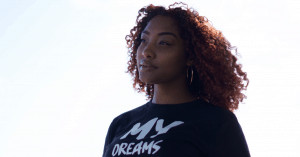What Causes Dry Hair And HOW Can Dry Hair Be Fixed?

So many products are designed for ‘dry hair’ that you’d think ‘dry’ is an actual hair. In reality, hair is not a martini. And ‘dry’ is not a hair type so much as it is a condition, which often occurs when something isn’t in order. As such, it can also be brought back to order in some cases.
Basically, dry hair is brittle and malnourished strands. It could be the result of a single factor or many, and it causes your locks to be prone to breakage. We know that hair is truly affected by an individual’s genetic makeup. It influences their hair type, texture, and color. And we also see this with hair loss and baldness. Genes aside, though, there are different reasons for developing a dry scalp and hair.
Under normal circumstances, the body distributes its natural oil – the sebum – all over most of the body. The scalp gets some special treatment because it’s where the hair roots and follicles are. Proper sebum distribution is a big part of what keeps our hair looking good and growing in a healthy way. Lack of sebum will cause moisture levels to drop significantly, resulting in dryness.
We humans are fairly hairless. We grow hair in several strategic locations – the most obvious of which is the top of our head. When the scalp and hair are doing well, the inner and outer layers of the hair produce the best-looking strands. Our scalp and hair is so easily affected by our conduct and routine, however, that hair often necessitates a higher degree of maintenance.
If you’re experiencing chronic dryness issues, flakiness, redness, or itchiness – get yourself to a doctor and see what’s up. Here are a few things to factor in when considering the cause of dry hair.
Hard Water

The type of water you shower with can affect your hair health.
Some water can be good for your overall health but not as good for your scalp and hair. There are locations around the world, and in the US, where the water is considered ‘hard’. This means it has a comparatively higher content of minerals. ‘Soft water’ which does not carry the same amount. Many times, these minerals add to the quality of drinking water but lower the quality of the hair-washing water. This is largely due to the tendency of such minerals to create buildup, block off pores and/or follicles, and consequently dry the scalp and hair.
A scalp which is subjected to hard water on a regular basis may find it more difficult to provide the hairs with the nourishment they need. This causes the hair to become brittle, broken, and – in some cases – to fall out prematurely when left unchecked. There are several popular ways of eliminating or combating the effects of hard water on your hair:
- Install a hard water filter in your shower, cutting the problem off at the source
- Use a vinegar or lemon rinse on occasion: the acidity helps remove buildup
- Buy a buildup-clearing shampoo or a designated leave-in product
- Use essential oils on damp hair to counter possible dryness
If you use any colors or dyes on your locks, be aware that hard water can actually change the complexion of your hair. This can cause the dye or color to fade early, pick up brassy tones, and/or lose its color altogether.
You should take care to counter the effects of hard water on color, but there is a catch here. Be sure to use products or methods which are suited for colored-treated hair. Otherwise, you run the risk of stripping more than just excess minerals from your hair.
Overwashing

Washing your hair too much can actually make it dry.
As we know, you can get too much of a good thing. No one doubts that hair care is important, but overwashing your locks can cause them potential damage.
Not everyone needs to shampoo every single day. Likewise with a conditioner. There are exceptions, of course. If you’re working outside or working out at the gym and you finish your day or session as a sweaty and dirty mess – yes, by all means, shower. Hair care products are meant to remove excess oil and grime from the scalp, so obviously they have merit. But overdoing it can leave your hair dry and your scalp sorely lacking in moisture. Even if the product you are using is meant to provide moisture!
Speaking of lacking things: don’t be afraid to leave some amount of dirt and oil on your scalp. The point of using shampoo isn’t to remove everything. After all, there are some advantages to having a small amount of oil and debris on your scalp. They act as a physical barrier. And they make the hair shinier, more elastic, and cleaner. The scalp is not meant to be 100% clean all of the time.
If you feel you may be overwashing, stop washing and let the hair and scalp regain natural balance. If – after a couple of weeks – you see no noticeable change in the dryness or its symptoms, consider seeing a physician for a check up.
Some say that overwashing is a myth, and that one needs only to switch to a more suitable shampoo and continue washing daily. Ask your health care pro, and see where they weigh in on that.
Underwashing

You do need to cleanse your hair occasionally in order to have it looking and feeling its best.
Underwashing is also responsible for some cases of dryness, though definitely to a lesser degree than overwashing is. More often than not, if you leave the hair alone it will find a way to balance itself out, sebum-wise. But again, other factors are involved. So you can’t self-diagnose 100% and state the cause of an issue with complete certainty.
Even when the body is healthy and functioning properly, it still produces dead skin and sometimes more than enough oil. This debris and oil needs to be stripped off of the scalp and taken out of the hair. A healthy individual can get away with not washing their hair for even up to a couple of weeks. After that, it’s best you undergo a shampoo session (or use some other type of cleanser). This will make sure that the hair follicles remain strong and vital, and that your scalp doesn’t start itching and flaking.
The ‘no poo’ movement has gained many followers in recent years. But I have a feeling even its most extreme proponents would agree that you need to do some cleansing on occasion. The followers of ‘no poo’ may not use a commercial store-bought shampoo. But they do realize the importance of cleaning your scalp with more than just water, and they will use something else which achieves the same goal.
Clean hair is happy hair, but some amount of dirt and oil is fine. Don’t overwash, don’t underwash! If you want to fix this issue, try establishing a routine which allows for proper maintenance to take place and new hair to grow unencumbered. Finding a balance has to do with other things besides the use of hair care products, as we are about to see.
Climate

Taking care of your skin is key to taking care of your hair.
When it gets too cold or too hot, the scalp reacts. Winter is a known contributor to skin dryness at large, not just on the scalp. Many people develop some type of dryness on their skin, scalp, and/or lips during the winter months.
Any kind of extreme, be it hot, cold, humid or dry, can have a potentially negative effect on your scalp. It may cause it to feel tight and painful, and it can even contribute to flaking and hair breaking/shedding. Now, to be clear, some shedding is okay and is perfectly natural. But you want to avoid the scalp turning on itself due to some overstimulation.
The best way to avoid climate-related dryness of the scalp and hair is to dress properly. In the cold days of winter, make sure to cover up. In days of hot summer, make sure to cover up! Also, changing a shampoo could help keep your scalp “guessing”. There are even products made specifically for the winter months.
Climate-related issues can be mitigated (or at any rate lessened) by taking proper precautions and using the right kinds of products. You can’t change the weather, but you can change your reaction to the weather.
Hormonal Imbalances
The hormones are the body’s messengers. They regulate sleep, mood, immunity, appetite, sex drive, and much more. When these messengers are unbalanced, their signals can get crossed or become ineffective. The hair may become thin, dry, and broken as a result.
Hormonal imbalances make it sound like something is ‘off’ about the individual. But in truth, such imbalances are not always unnatural. Some of them are simply part of a normal circle of life, such as menstruation or pregnancy in women and puberty and aging in men. Sometimes the body can work itself out and get those messengers back on their feet. Other times, a hormonal imbalance requires medical attention, since it could also be the result of an underlying condition.
If you feel you are experiencing a hormonal imbalance, get looked at by a doctor. They could order one or more type of test. And then – depending on your symptoms and the test results – you will know more about the nature of your condition. After that, you can go about correcting it and bringing it back to balance. Common solutions include medication, switching up your diet, and implementing changes in habit and lifestyle.
Using The Wrong Hair Care Products

Make sure to research which products might be best for your hair.
With so many hair care solutions around, it’s easy to use the wrong hair care products or to stick with one out of habit (even though it has run its course). Also, it doesn’t exactly help that so many products’ ingredients lists require a PhD in chemistry to decipher. Some products do indeed clean your hair as advertised but then leave it feeling dry and looking lifeless, bereft of sebum and sustenance.
Similar to overwashing and underwashing, this is a problem that can make itself more clear to you once you temporarily stop using products and re-evaluate your natural state. You may find out that you’ve been using shampoo loaded with oil on a scalp which is already naturally oily! Or you could discover that you’ve been using a harsh oil-stripping shampoo on a scalp which is already naturally dry.
Just because your hair reacts well to one kind of product, do not assume that it will never require another. Your scalp and hair, much like the rest of you, can experience changes over time. Do the research, experiment with different products, and see which ones yield the best results for you. Also, there is always the DIY path, which can be highly rewarding in the short and long term.
Conclusion
Hair maintenance can be a real drag, but it is seldom hopeless. More often than not, the reason for your dryness is one which you can tackle on your own and even repair over time. For most people who suffer from dry scalp and hair, the problem begins and ends with sebum production, distribution, and retention. One of those three (or all of them) need to be looked at and explored, then brought back to balance.
This list is not an all-inclusive one, although it represents the common causes of dry scalp and hair. Remember that no matter what state your hair is in, if it is still growing you can do something about it. That’s part of the greatness of hair: it simply grows.
Having healthy, vital, strong hair is not beyond you, even if we are to say you’re at the shallower end of the hair gene pool. Thanks to advances in science and technology, you can use different products and methods to revitalize your locks. And you can then keep them looking good by making the necessary changes, be they in product use, diet, habit, or lifestyle.
Dry hair is not a hair type. It’s a condition. And you are the one who can turn it around. If you’re not sure where to start, simply stop using products for a few days (or even a couple of weeks), see where you’re at, and take it from there. If you have any doubts or concerns, get yourself to a GP or dermatologist.

